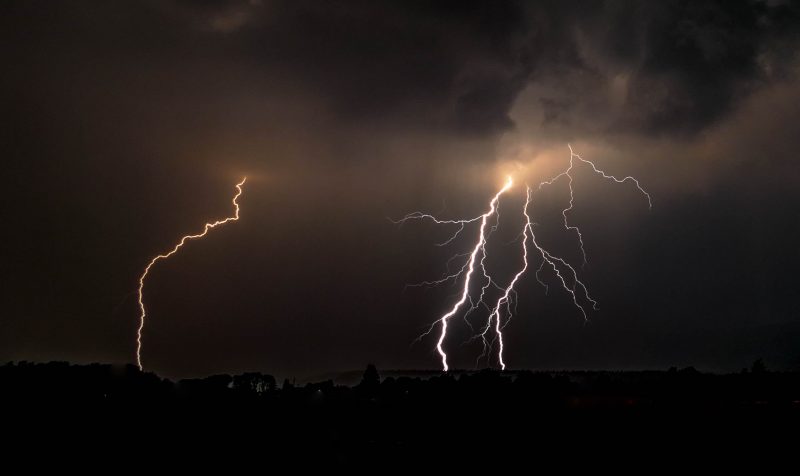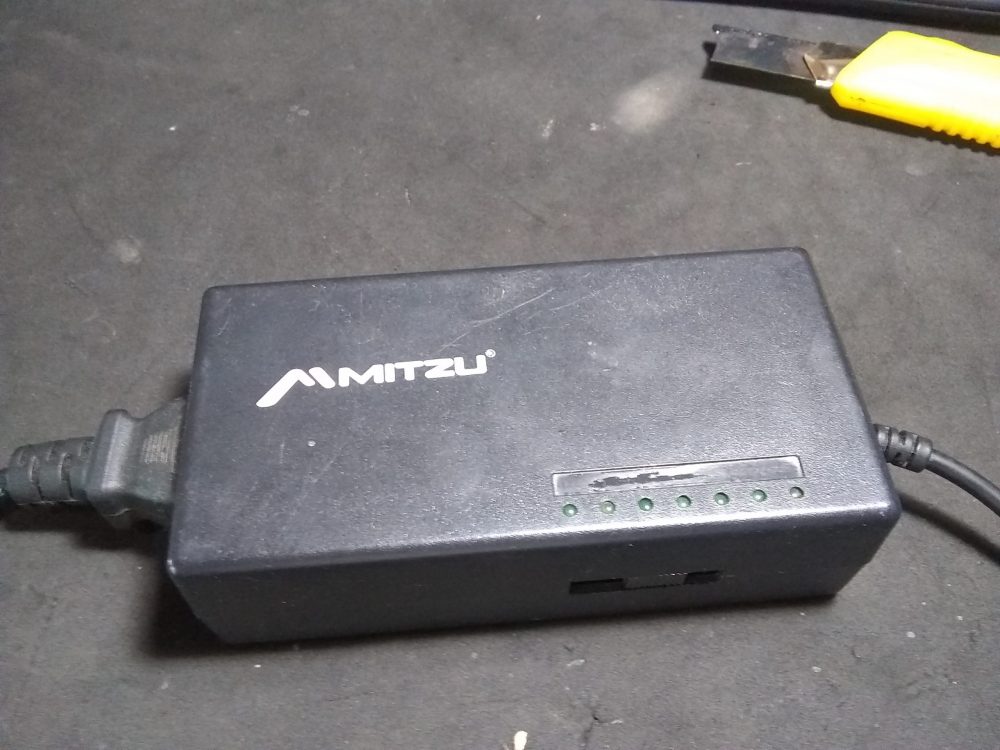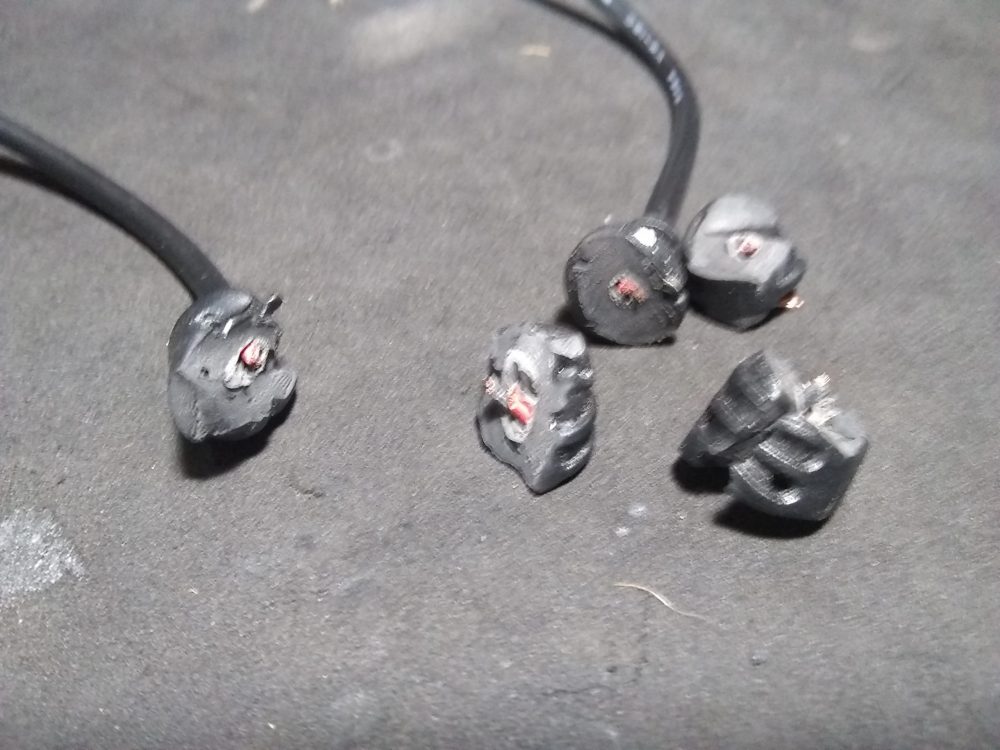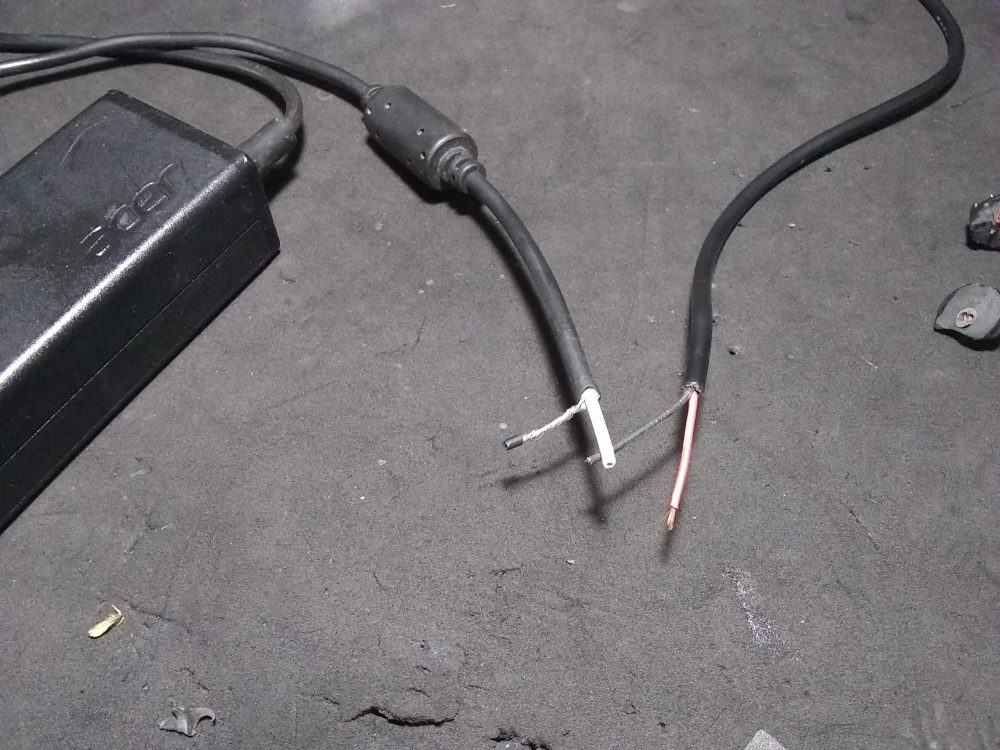 Many thanks to SWling Post contributor, Emilio Ruiz, who shares the following guest post:
Many thanks to SWling Post contributor, Emilio Ruiz, who shares the following guest post:
Apprehending an RFI-generating monster!
At the beginning of the year, I was sad because, at home, an awful RFI noise appeared. The next few months the noise increase until S9!!. Day and night my receivers and my feelings were so dampened with this terrific RFI–only the lower Broadcast Band (900 to 540 Khz) was relatively immune to it.
Yesterday, we had a storm and the mains electricity service went off, so I connect a 12 volt battery to my RT-749b military surplus transceiver and the received signals were very clean like the “good old days”.
(Above: Listen W1AW loong distant from my QTH in Chiapas Mexico).
When the power electricity come back on, so did the RFI too!!
(Above: W1AW gone)
Remembering the recently publish post in SWLing Post about RFI, I did some testing by
cutting the electricity to my home (the main switch) and the RFI was gone!! So I discovered the RFI lives in my house–not in the outside wires!!
I put batteries in my old shortwave portable radio and searched (like Ghostbusters) all outlets contacts, one by one, connect and disconnected each device.
And I found the guilty party!
On December 2019, the power supply of my son’s laptop broke, so I bought a cheap substitute.
The RFI produced by this little monster could be heard at a distance of about 200 meters from my QTH!!! (Much like an old transmitter spark gap–!)
Even this cheap power supply apparently featured ferrite toroids on the wire but turns out it is fake!! It was only a plastic ball!
The wires were also not shielded. No doubt one of the worst switched-mode power supplies I could have purchased.
I found a old Acer power supply with same specs and I replaced out the RFI monster one.
And now? The shortwave bands are clean again.
(Video: Testing my Kenwood R-600 rx with Radio Exterior de España… plugging and unplug the Mitzu monster RFI generator).
So I wanted to share what happened to me, so perhaps it can be useful for other SWLing Post blog friends.
Watch these little switched mode power supplies from all devices in your home. Replace them if you detect RFI levels that harms SWLing. Consider disconnect all devices (vampire consumption–or phantom loads) if not in use; the radio waves and electric bill will be grateful to you!
WOW! What a difference! Emilio, that was great investigative work on your part. It’s as if that switching power supply was specifically designed to create RFI! No shield and fake toroids? That’s just criminal in my world!
Thank you so much for sharing your story. Hopefully, this might encourage others to investigate and apprehend their own local RFI monsters!
(And by the way, Emilio, I love that RT-749b military transceiver!)




Warning! Warning! I had a vert similar problem with an Apple notebook PC replacement power supply substitute. There are no markings UL CSA for ITE equipment. I ended taking it apart and there was no attempts for line noise filtering. These cloak and dagger supplies made in China come and go with the spring mushrooms.
I’m not entirely sure how sitting outside in 15 or 20 degree Fahrenheit weather trying to listen to the radio is considered compelling. It sounds more like a rather uncomfortable activity to me.
Just about every hobby has moments where it is potentially encroached upon and it’s up to the members of this hobby group whether or not they want to take action to protect the hobby they enjoy so much. Vintage car enthusiasts petition for their cars to be excluded from the rules and regulations of the low emission zones that are in place in certain cities, model airplane enthusiasts petition and work to keep their airfields and practice spaces from being taken from them and developed into other types of property and skateboarding enthusiasts petition their cities and towns for dedicated skating areas and/or funding to develop a skate park.
So the question is, how badly do you want it? How much does the hobby mean to you? If you sit idly by, do nothing and then speak negatively of the people and appliances that encroach upon on your listening experience then how does that improve or enrich the hobby in any positive manner? How have you helped the hobby in any way?
I am confused by your continual references to litigation. As I had mentioned in my first reply, a diplomatic and gentle approach often results in a much better result than just marching up to someone or some business’s door, waving your arms in complaint and threatening litigation. Aggressive behaviour just places people immediately on the defensive and shuts down any chance of negotiations thus eliminating any chance you had of being able to explain your situation, work toward an understanding and an agreed upon solution.
Clubs for hobbies not only serve to help bringing together people with a common interest but they also serve as advocacy groups for that interest. A chorus of voices has a greater effect than a lone voice. 50 people of an amateur radio club calling the power company and letting them know of a noise concern from a faulty streetlight or power line insulator resonates a lot more loudly in the appropriate departments of said company than one voice trying to do the same.
You seem to have glossed over the section where I speak of arming yourself with technology in order to work around interference problems. Certainly, some interference problems cannot be eliminated and so it is up to us to construct intelligent solutions to mitigate or eliminate these solutions. The hobby of radio listening and radio electronics contains experimentation as one of its focal points and so wouldn’t this fall under that category? Again, with effort, one can reap rewards.
With any hobby there will be times where you will need to defend it from people and things that may intend to impinge upon it and your ability to enjoy it. The question is, will you defend it or will you sit back, take no action, speak negatively of the current situation and wax lyrically about “the good old days”?
The choice is yours.
The above response is in response to 13dka’s comments. For some reason I was not able to reply directly to their message.
Here it´s a TV set that causes heavy interferences. Other local RFI issues are solved “quite well” using the filters in my Winradio rx. Still, for real DX I am going portable nowadays.
Btw. I have been twice to Chiapas many years ago. Once we spent a most interesting week visiting several remote refugee camps along the border to Guatemala. It was quite difficult to get there, walking through deep mud for several days. Meeting with people in southern Mexico was a fascinating experience. I carried a Sony ICF-SW7600G with me into the jungle. No electricity and no RFI at all 🙂
73s Harald, the inmigrant situations is worst with the pandemic. Saludos desde Chiapas.
Yes, Emilio, I am trying to follow the situation. Bad news.
Saludos Harald
This is quite common! Some time ago I had a similar problem.
The first procedure should be like this: Turn off one circuit breaker after the other. Chances are very good that suddenly the RFI is gone. Then you know the room with the RFI source. The problem was with an USB power sullly in my bedroom.
I had a similar issue today with USB power supplies. I was trying to find a raspy
noise that had a beep to it that I was hearing on my shortwave radio. I could hear
it in every room in the house. I pinned it down to a usb power cube. I swapped the
cube out for a another one and the nose went away. The power cube was “smart IQ”
type. I think it pulses the lines to determine what power can be applied. The cube I
replaced it with was a dumb cube that can provide up to 1amp.
A little while later today I noticed that my TV sound bar had a low level raspy sound
with a beep – this was with the tv turned off. I had never had a problem with it before
so was a little confused as to why I did now. Turns out that in swapping around
the power cubes today (to fix the earlier noise problem), I had unplugged the sound bar
from a dedicated cube and had plugged it into a 5-port power cube. Once I plugged it
back into the dedicated cube, the noise went away.
Again, the five port cube is a “Smart IQ” system.
I’ve come to the conclusion that the smarts in some of these power cubes can create
extra noise.
73
Bill
WD9EQD
Smithville, NJ
Samuel Rhine, this is something you may want to contact the power company about. If the arcing noise is that strong and that pervasive, something is not properly installed and is going to fail in very short order. It may also be that they have a lot of dirty insulators which need to be cleaned.
Again, it helps to track this down and let them know where you’re finding this problem. They will appreciate the tip, if they’re even slightly competent. And if they’re not, well, perhaps you can find some recommendations for a standby generator –because you’re going to need one.
Opposite for me unfortunately. After a huge house fire in my town cut off all the phone, internet, and cellular somehow after it took down a line, but thankfully not power outside the neighborhood of the fire, the power lines got all crackly noisy all over town. It can sometimes be tuned out using a DSP radio if you’re not too close but the only decent spots now are taking the portable down the bicycle trail to certain to certain holes in the grid where the nearest lines are far away, thankfully one of those spots have benches there.
You might want to call up your power company and report this.
Oh they don’t care, they wouldn’t waste time or money on this. I talked to an old ham operator who said they have a truck full of equipment specifically for dealing with that but haven’t in years since the last guy who used to do it retired and was never replaced.
A lot of companies don’t care and the FCC rarely does anything anymore. The noise is just a part of the modern SWL experience these days it seems.
Have you tried asking nicely? Considering how this seems to be an issue that bothers you it seems like it would be worth your time to ask and have it looked into. You never know, you may catch a receptive ear at the power company.
It confuses me a fair bit when these sort of topics come up where people speak about RFI problema in their listening area and then speak of how the only real solution is to leave their home and go to a park or other rural area to escape it. So many posts seem to concede that “there is nothing that I can do about it!” and leave it at that. What about during the winter? They seem to have great enthusiasm for the hobby but do not seem to wish to do anything about it when defense, or diplomatic and polite offense, is required to protect it from RFI issues.
If you are experiencing an RFI issue in your home then why not first try, with portable radio in hand tuned to the frequency where the interference is greatest, shutting off each circuit breaker in their home one by one until the problem disappears. Then identify the problem device on that circuit. Is it a small switch mode supply? Does it use a common 5vdc, 12vdc or 24vdc supply voltage? Replace it with a linear power supply! Such supplies are available new from vendors like Jameco or used from a variety of sources. Another solution for 12v devices is to take an Astron linear power supply and adjust the voltage down to 12vdc. I replaced the three switch mode power supplies that make up my wireless network system with an Astron linear supply and removed a great deal of RFI in the process.
Is the noise not coming from your house? Take your portable radio and walk around the neighbourhood to try and source it. If you have a small loop antenna then use that when you are out searching to help in figuring out which way to look. If you do not, tune to the frequency of greatest interference and walk until you find the peak. Switching to the AM band, and using the directional capabilities of your radio’s ferrite bar, you can help pinpoint the source. Also, listening for the noise source on the VHF air band can help as you generally will not begin to hear the RFI until you are right on top of it.
Does the noise that you found seem to be coming from a power pole? Give the power company a call but try and phrase it by saying that your AM radio reception is affected as that is a more commonly understood complaint and will help you not come off as overly picky or fussy. Also, AM radio is still more of a commonly used service than shortwave listening or amateur radio and so it may cause for more eyebrows to be raised. Power companies generally like to know about noise problems as noise problems usually are an early warning sign to a potential failure and outage which is something that no power company wishes to deal with. Be persistent but polite with your inquiries. Take video recordings of your RFI especially if it is an intermittent case.
Is the noise not coming from a power line but rather a business or a home? Can you see any obvious RFI producing devices on the building in question such as neon signs or solar panels? Politely report your findings to the owner of the building. This can be a difficult area due to the mood and response of the owner. Some are helpful whereas others are hostile. I am still trying to figure out how to successfully navigate this. There are quite a few stories of how amateur radio operators have spoken to owners of homes or businesses and have worked with them to solve the RFI problem. I would highly recommend reading these. Again, some owners may be happy to know of the issue as sometimes new RFI may mean that said device may have a fault and could possibly fail in the near future. But please, do not handle or try to repair the equipment in their home or business by yourself. Allow a professional chosen by them to do so. Just make sure that you inform said professional of the problem and where you think that it may be coming from. If the owner proves resistant, a call to the FCC or the ARRL (if you are an amateur radio operator or, honestly, even if you aren’t the ARRL may still want to hear about it as the RFI may affect amateur radio operators in your area) and possibly your local amateur radio club, if you have one, may be in order to notify them of the problem and thus give the owner of the offending home or business something to think about.
If that is not successful then one should try taking defense measures such as building or acquiring a loop antenna, be it passive or active, to help null out the offending noise. Perhaps try an antenna phasing unit in conjunction with the loop antenna to help create one null point with a second steerable null for multiple noise sources.
Perhaps consider using an SDR for your listening and taking adventure of both the excellent noise blanker and noise reduction systems available in the receiving software that is available?
In conclusion, If you have an RFI issue and the hobby means a great deal to you then perhaps try a few steps to try to either eliminate or mitigate the problem? Your hobby has just as much right to be eligible for consideration and accommodation as any others. Make your voice known and heard! Experiment!
Hi Mike,
This may require a character willing to fight potentially perpetual fights. If you live on the countryside with a neighbor buying/installing some noise source, this can be talked about and if not,, this could be fought against. Likewise, with similar chances of getting anywhere (or not), when some company is responsible for the QRM.
Reality for many SWLs and hams , particularly in cities etc. is that the number of sources is now just overwhelming. Are you going to talk to like 30 direct neighbors after telling apart who’s using mowing robots, bad TVs, installations of all sorts or PLC devices and sent them the authorities if they won’t bulge? If you do, is your wife willing to help coordinating the court appointments, because you’re likely also having to sue the city for installing LED streetlights emitting enough QRM to destroy your 20m DX ambitions but maybe not enough to violate any regulations.
Even if you had a chance and the funds to sue your entire environment and win, the quiet would last only so long and it all wouldn’t bring back the conditions we had 40 years ago, because much of the noise is propagated from outside of your near field and you’d have to shut down the whole town to achieve this.
Even if this would be taken to an organized, lobby-forming effort of ham radio clubs etc – while the quite similar light pollution issue doesn’t have many sympathizers either, people can at least kind of intuitively understand that “our kids can’t see the beauty of the stars anymore, some have never seen the Milky Way in their life, isn’t that sad?”, it’s pretty hard to find a similar tearjerker story for “our” part of the spectrum. For regular people and deciders we’re just weird people clinging to some (for them) hopelessly outdated technology, like gramophones or steam-powered cars, and to find broad support for this is….hopeless?
Sounds so much more compelling to just pack up some stuff and move outsides, it’s even healthy (also in winter) and if you are willing to drive a bit you can even enjoy the hobby in ways that haven’t been possible from at home, ever.